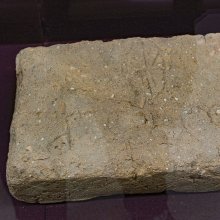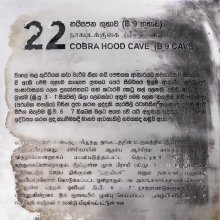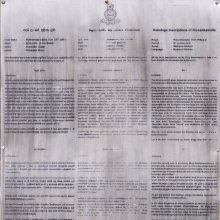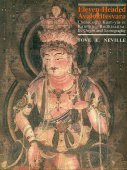Mi, Mī: 14 definitions
Introduction:
Mi means something in Hinduism, Sanskrit, Marathi, Jainism, Prakrit, biology, Tamil. If you want to know the exact meaning, history, etymology or English translation of this term then check out the descriptions on this page. Add your comment or reference to a book if you want to contribute to this summary article.
Images (photo gallery)
In Hinduism
Vyakarana (Sanskrit grammar)
Source: Wikisource: A dictionary of Sanskrit grammarMi (मि).—(मिप् (mip)) personal ending of the first person (उत्तमपुरुष (uttamapuruṣa)) singular; cf. तिप्तस्झि (tiptasjhi). P.III.4.78.

Vyakarana (व्याकरण, vyākaraṇa) refers to Sanskrit grammar and represents one of the six additional sciences (vedanga) to be studied along with the Vedas. Vyakarana concerns itself with the rules of Sanskrit grammar and linguistic analysis in order to establish the correct context of words and sentences.
Biology (plants and animals)
Source: Google Books: CRC World Dictionary (Regional names)1) Mi in Togo is the name of a plant defined with Oryza sativa in various botanical sources. This page contains potential references in Ayurveda, modern medicine, and other folk traditions or local practices It has the synonym Oryza sativa var. flavoacies Kara-Murza ex Zhuk. (among others).
2) Mi in West Indies is also identified with Zea mays It has the synonym Zea mays var. virginica Bonaf. (etc.).
Example references for further research on medicinal uses or toxicity (see latin names for full list):
· Blumea, Supplement (1946)
· Flora Brasiliensis (1871)
· De Fructibus et Seminibus Plantarum… . (1788)
· Proceedings of the Indian National Science Academy. Part B, Biological Sciences (1989)
· Physis. Revista de la Sociedad Argentina de Ciencias Naturales (1933)
· Phytologia (1978)
If you are looking for specific details regarding Mi, for example chemical composition, diet and recipes, extract dosage, side effects, pregnancy safety, health benefits, have a look at these references.

This sections includes definitions from the five kingdoms of living things: Animals, Plants, Fungi, Protists and Monera. It will include both the official binomial nomenclature (scientific names usually in Latin) as well as regional spellings and variants.
Languages of India and abroad
Marathi-English dictionary
Source: DDSA: The Molesworth Marathi and English Dictionarymī (मी).—pron(mayā S The third case of asmad) I. mī mhaṇaṇēṃ To say I; to proclaim one's self; to fill the scene with I. This is an expressive phrase, of very extensive application and in constant use. Ex. pāūsa mhaṇatō mī; ūna mhaṇatēṃ mī; vārā mhaṇatō mī; rāna mhaṇatēṃ mī; nadī mhaṇatī mī The rain, the wind, the heat, the wilderness, the river--says I--It is I--Who or what but I? i.e. The rain &c. is overabounding, all-pervading and prevailing, alloverwhelming. The phrase is used as well of blessings as of calamities, of good occurrences as of bad, and as well of actions and substances and things, as of phenomena; ever expressing all-overspreading prevalence or profusion. Ex. pīka or dhānya mhaṇatēṃ mī; āmbā-ūsa-gūḷa mhaṇatō mī; laḍhāī mhaṇatī mī. 2 also, as reduplicated, mī mī mhaṇaṇēṃ To be full of one's self; to be egotistical. mīcēṃ ghara khālīṃ The proud can never be esteemed; " he that exalteth himself shall be abased." See phrase under abhimāna.
Source: DDSA: The Aryabhusan school dictionary, Marathi-Englishmī (मी).—pro I. mī mhaṇaṇēṃ Proclaim one's self. mīmī mhaṇaṇēṃ Be egotistical.
Marathi is an Indo-European language having over 70 million native speakers people in (predominantly) Maharashtra India. Marathi, like many other Indo-Aryan languages, evolved from early forms of Prakrit, which itself is a subset of Sanskrit, one of the most ancient languages of the world.
Sanskrit dictionary
Source: DDSA: The practical Sanskrit-English dictionaryMi (मि).—5 U. (minoti, minute; rarely used in classical literature)
1) To throw, cast, scatter.
2) To build, erect.
3) To measure.
4) To establish.
5) To observe, perceive.
6) Ved. To fix in the earth.
--- OR ---
Mī (मी).—I. 9 U. (mīnāti mīnīte; seldom used in classical literature)
1) To kill, destroy, hurt, injure.
2) To lessen, diminish.
3) To change, alter.
4) To transgress, violate.
5) To disappear, be lost.
6) To stray, go astray. -II. 1. P., 1 U. (mayati, māyayati-te)
1) To go, move.
2) To know, understand (gītamatyoḥ). -III. 4. Ā. (mīyate) To die, perish; see प्रमी (pramī); जन्तोः प्रमीयमाणस्य जीवो नैवोपलभ्यते (jantoḥ pramīyamāṇasya jīvo naivopalabhyate) Mahābhārata (Bombay) 12.186.3.
--- OR ---
Mī (मी).—1 P. (mīmati)
1) To go, move.
2) To sound.
Derivable forms: mīm (मीम्).
Source: Cologne Digital Sanskrit Dictionaries: Shabda-Sagara Sanskrit-English DictionaryMi (मि).—[(ḍuñ)ḍumiñ] r. 5th cl. (minoti minute) 1. To cast, to throw, to throw about, to scatter. 2. To measure. 3. To perceive. (This root is not used in classies.)
--- OR ---
Mī (मी).—r. 1st and 10th cls. (mayati māyayati-te) 1. To go, to move. 2. To know. (ṭu, ṅ) ṭumīṅ r. 4. cl. (mīyate) To part with life, to die. (ña) mīñ r. 9th cl. (mīnāti mīnīte) 1. To hurt, to injure, to kill. 2. To violate. 3. To diminish. 4. To go astray.
Source: Cologne Digital Sanskrit Dictionaries: Benfey Sanskrit-English DictionaryMi (मि).—ii. 5, [Parasmaipada.] [Ātmanepada.] To throw.
--- OR ---
Mī (मी).—ii. 9, mīnā, mīnī, and ved. minā, minī, [Parasmaipada.] To hurt. Comp. ptcple. pres. a-minant, Not hurting,
— With the prep. ā ā, ii. 9, To hurt, to scrape off,
— With pra pra, ii. 9, 1. To diminish,
— Cf. [Latin] prō-mīnere, e-minere, minere, prō-minare, e-minus, co-minus, minari.
--- OR ---
Mī (मी).—i. 1 and 10, [Parasmaipada.] To go, see me.
— Cf. [Latin] meare and movere (causal).
Source: Cologne Digital Sanskrit Dictionaries: Cappeller Sanskrit-English DictionaryMi (मि).—1. minoti minute [participle] mita (q.v.) fix, establish, build, erect, measure, observe, perceive.
--- OR ---
Mi (मि).—2. v. mī.
--- OR ---
Mī (मी).—mināti (minoti) damage, lessen, diminish; fail, transgress; frustrate, annul; [Middle] [Passive] mīyate, mīyate perish, be lost. [Causative] māpayati only with pra (q.v.)
Source: Cologne Digital Sanskrit Dictionaries: Monier-Williams Sanskrit-English Dictionary1) Mi (मि):—1. mi (cf. √3. mā and mī) [class] 5. [Ātmanepada] [Parasmaipada] ([Dhātupāṭha xxvii, 4]) minoti, minute ([perfect tense] [Parasmaipada] mimāya, mimyuḥ, [Ṛg-veda], mamau, [grammar]; [Ātmanepada] mimye [grammar] [Aorist] amāsīt, sta, [ib.]; Prec. mīyāt, māsīṣṭa, [ib.]; [future] mātā, māsyati, te, [ib.]; p. meṣyat [?] [Aitareya-brāhmaṇa]; [indeclinable participle] -mitya, [ib.], -māya [grammar]),
—to fix or fasten in the earth, set up, found, build, construct, [Ṛg-veda; Atharva-veda; Śatapatha-brāhmaṇa; ???];
—to mete out, measure, [Varāha-mihira’s Bṛhat-saṃhitā];
—to judge, observe, perceive, know, [Māṇḍūkya-upaniṣad, 12 mantra; Mahābhārata];
—to cast, throw, scatter, [Dhātupāṭha] :—[Passive voice] mīyate ([Aorist] amāyi [grammar]), to be fixed etc., [Atharva-veda] :—[Causal] māpayati ([Aorist] amīmapat) [grammar]:—[Desiderative] mitsati, te, [ib.] :—[Intensive] memīyate, memayīte, memeti, [ib.]
2) 2. mi See √mī.
3) Mī (मी):—1. mī [class] 9. [Ātmanepada] [Parasmaipada] ([Dhātupāṭha xxxi, 4]) mīnāti, mīnīte ([Vedic or Veda] also mināti and minoti; mīyate or mīyate [Dhātupāṭha xxvi, 28]; mimītas, mimīyāt [?]; [perfect tense] mimāya, [Ṛg-veda]; mīmaya, [Atharva-veda]; mamau, mimye [grammar]; [Aorist] amāsīt, amāsta [grammar]; meṣṭa, [Atharva-veda]; [Aorist] [Passive voice] amāyi, [Brāhmaṇa]; Prec. mīyāt, māsīṣṭa [grammar]; [future] mātā, māsyati, te [grammar]; meṣyate, [Brāhmaṇa]; [infinitive mood] -miyam, -miye, [Ṛg-veda]; metos, [Brāhmaṇa]; [indeclinable participle] mītvā, -mīya, māya [grammar]),
—to lessen, diminish, destroy ( and [Passive voice] to perish, disappear, die), [Ṛg-veda; Atharva-veda; Brāhmaṇa; Upaniṣad; Bhāgavata-purāṇa];
—to lose one’s way, go astray, [Ṛg-veda];
—to transgress, violate, frustrate, change, alter, [Ṛg-veda; Atharva-veda] :—[Causal] māpayati [Aorist] amīmapat. See pra-√mī;—[Desiderative] mitsati, te [grammar]:—[Intensive] memīyate, memayīti, memeti[ib.]
4) cf. [Greek] μινύω ; [Latin] minuere; [Slavonic or Slavonian] mĭnij; [German] minniro, minre, minder; [Anglo-Saxon] min.
5) 2. mī See manyu-mī.
6) 3. mī [class] 1. 10. [Parasmaipada] mayati or māyayati, to go, move, [Dhātupāṭha xxxiv, 18];
—to understand, [Vopadeva]
Source: Cologne Digital Sanskrit Dictionaries: Yates Sanskrit-English Dictionary1) Mi (मि):—(ḍa, ña) minoti, minute 5. c. To cast, to throw, to scatter.
2) Mī (मी):—(ki) mayati māyayati 1. 10. a. To go; to know. (ṅa, ya) mīyate 4. d. To die. (ga,ña) mīnāti, nīte 9. c. To hurt, to kill, to injure.
[Sanskrit to German]
Sanskrit, also spelled संस्कृतम् (saṃskṛtam), is an ancient language of India commonly seen as the grandmother of the Indo-European language family (even English!). Closely allied with Prakrit and Pali, Sanskrit is more exhaustive in both grammar and terms and has the most extensive collection of literature in the world, greatly surpassing its sister-languages Greek and Latin.
Prakrit-English dictionary
Source: DDSA: Paia-sadda-mahannavo; a comprehensive Prakrit Hindi dictionaryMi (मि) in the Prakrit language is related to the Sanskrit word: Mṛt.
Prakrit is an ancient language closely associated with both Pali and Sanskrit. Jain literature is often composed in this language or sub-dialects, such as the Agamas and their commentaries which are written in Ardhamagadhi and Maharashtri Prakrit. The earliest extant texts can be dated to as early as the 4th century BCE although core portions might be older.
Kannada-English dictionary
Source: Alar: Kannada-English corpusMī (ಮೀ):—
1) [verb] to take a bath; to bathe oneself.
2) [verb] to wash (a person or object) in water or other liquid.
3) [verb] to become wet, moistened.
4) [verb] (fig.) to be overwhelmed (as with a flood).
Kannada is a Dravidian language (as opposed to the Indo-European language family) mainly spoken in the southwestern region of India.
See also (Relevant definitions)
Starts with (+3147): Activity of the mind, Goat milk, Makkhali Sutta, Masivala, Meet-lagaai, Meetha-chapat, Mellidal, Mi chi bian dan gan, Mi die xiang, Mi feng hua, Mi feng hua shu, Mi guo mi zhu yu, Mi guo qin, Mi hsiang, Mi hua chai hu, Mi hua du jiao jin, Mi hua du xing cai, Mi hua hu tui zi, Mi hua huo tong shu, Mi hua mei deng mu.
Ends with (+2242): Aami, Aatmasanyamee, Abdugar rimi, Abhayami, Abhidhami, Abhigamin, Abhikkami, Abhimukhibhumi, Abhinami, Abhinandanasvamin, Abhinikkhami, Abhinirmi, Abhirami, Abhisami, Abhisammi, Abhishekabhumi, Abhismi, Abhitigmarashmi, Abhragami, Abhravibhrami.
Full-text (+1380): Yami, Mim, Nemi, Agamin, Klamin, Jami, Amin, Samin, Damin, Dyobhumi, Vami, Vyayamin, Udyamin, Avanamin, Purogamin, Krimin, Shighragamin, Adhogamin, Vataprami, Gramagamin.
Relevant text
One of your search terms exceeds the minimun character amount per search term. This amount currently equals 2.
No search results for Mi, Mī in any book or story.
Related products







